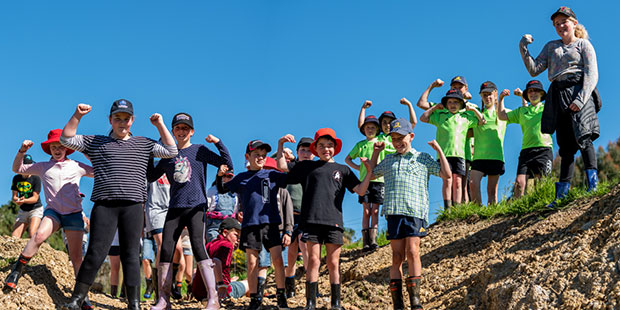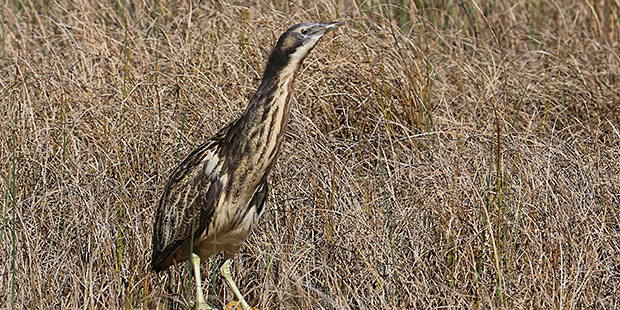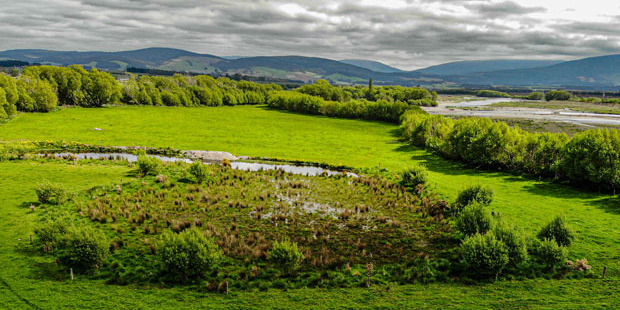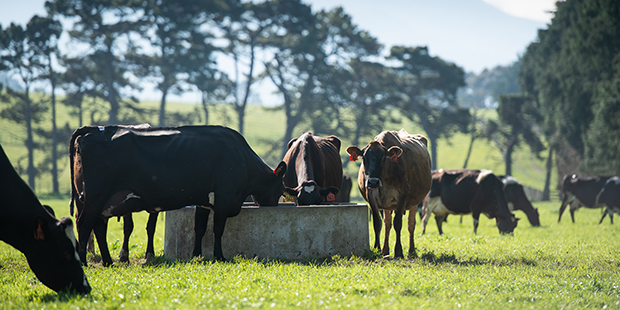The grandmother helping change dairy farming
A project to reduce nitrate run-off from farms also attracts critical corporate clout.


A key environmental project on lower North Island dairy farms has attracted renewed corporate backing – and a grandmother is helping bring it about.
Two of New Zealand’s biggest business players, Fonterra and Nestle, have joined a DairyNZ-led project in the Tararua district in which a blend of the herb plantain is being sown in pastures with the aim of both reducing nitrate run-off into waterways and lowering on-farm greenhouse gas emissions.

Plantain shows promise in Tararua project. Image / Supplied.
Plantain shows promise in Tararua project. Image / Supplied.
The two companies are bringing their muscle to the project by providing additional funding to enable the 50 farms taking part to increase the amount of plantain they grow.
Early stages of the project in 2017 indicated reductions in leaching of between 20 and 30 per cent could be achieved (eating the plant creates a lower concentration of nitrate in a cow’s urine) and preliminary studies also show it has potential to lower greenhouse gas emissions through reductions in nitrous oxide.
Now grandmother and fifth generation farmer Mavis Mullins has added her considerable influence to the project as it enters a crucial phase over the next two years through her role as dairy farmer chair for the project.
An inductee in the New Zealand Business Hall of Fame and a member of numerous boards, Mullins has carved a reputation as an agri-business icon and influential Maori leader since beginning her working life running the family shearing business with her late husband Koro.
Deeply steeped in the district (the shearing operation was started by her grandfather Lui Paewai, a member of the 1924 Invincibles All Black team undefeated in 32 matches in Britain in 1924) she knows the importance of caring for the land.
She is a believer in the Maori proverb which recognises that although people come and go, the land remains. “We are all judged on how well the land is when we pass it on to the next generation. It’s not always easy to measure, but we are in it for the long haul. Anything you do with land will take time.”
Today one of her business interests is a 110ha dairy farm she runs with her son-in-law near Dannevirke – and is how she came to be involved in the Tararua project. Although she has only been involved in the project in the last 12 months, she has been sowing plantain for five years.
“We have about a 30 per cent plantain mix on between 25 and 30 per cent of the pasture and we hope eventually to have it included over the whole farm,” she says.
“It is still too early for us to say how it is working, but we have just about completed our farm environment plan and are starting to see indications that things are moving in the right direction. Although we have a small property we have a strong sense of environmental stewardship and are keen to be doing the right thing.
“The fact we have a big river frontage (the farm borders about a 3km stretch of the Manawatu River) means we have to go over and above what is the norm,” she says. “Plantain is about both soil health and animal health and I see it as another tool in the environmental toolbox.”
Mullins says she and Koro moved very quickly after taking over the farm 10 years ago to lighten their footprint. Chiefly this involved fencing and riparian planting along the river bank: “The river can flood during heavy rainfall so we’ve put in thousands of plants to help control this including harakeke [New Zealand flax] which also act as great filters [of sediment and run-off].”

New Zealand Business Hall of Famer Mavis Mullins says the region's biggest challenge, post Covid 19, as industries continue to grow, is having skilled labour. Photo / Hawkes Bay Today.
New Zealand Business Hall of Famer Mavis Mullins says the region's biggest challenge, post Covid 19, as industries continue to grow, is having skilled labour. Photo / Hawkes Bay Today.
In other measures the couple reduced herd numbers – today the farm milks 240 cows in spring and 80 in winter – and introduced once-a-day milking.
With four adult children, her focus is on making a better world for her mokopuna. “It’s not about me, it’s about how we make a better footprint for the generations that are coming; how we make New Zealand or New Zealand Aotearoa a place that has meaning and relevance in a global context – I love that kind of thinking.”
Mullins says her role as dairy chair is to help create long-term outcomes including developing a community and collective approach to environmental care, a focus on research to provide additional tools to manage and mitigate possible detrimental effects to the land, water and ecosystems – and to acknowledge the contribution of big business like Fonterra and Nestle.
The DairyNZ collaboration with Fonterra and Nestle is helping accelerate the uptake of an environmentally functional blend of plantain known as ecotain, a cultivar developed by seed company Agricom.
Ecotain has been used in studies by DairyNZ, Agricom, Lincoln University, Massey University and AgResearch. The Ministry of Primary Industries is also a key contributor to the project.





